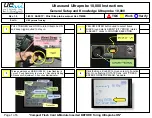
PART
LIST
GUITAR STRING MAINTEN ANCE
IF STRINGS ARE DIFFICULT TO PLAY OR DO NOT PL AY CORRECTLY:
Replacing guitar strings can remedy many problems involving poor sound. All strings can
be changed at once or strings can be changed individually. To change a guitar string, the
old string should be completely removed before attaching the new string. After the new
string is attached, the guitar will need to be re-tuned.
CHANGING STRINGS
REMOVING OLD STRINGS:
●To remove a guitar string, first, find the tuning peg; can get rid of tuning machine that the
string is attached to. Loosen the string by winding the tuning peg until the string has no
tension.
●Continue to wind the string loose until the string can be pulled loose from the top. The
strings can be pulled out via the bridge at the bottom of the guitar.
●If you do not wish to use the old string again, you can cut the string near the middle of the
strings via wire cutters. If you choose to do this, be careful and hold the string securely
next to the cut; otherwise, the string may pop up and can potentially harm you.
CHANGING STRINGS(Cont.)
Installing New Strings:
●Remove the bridge pin of your guitar. Bridge pins can stick to the guitar, and may take
some time to get off; the edge of a peg winder (available at any local music store) can be
used to help. Locate the proper string to replace your old string. Then, from the end of the
string that does NOT have a ball at the end, feed the string through the bridge via the open
hole exposed by removing the pin. Then, press the bridge pin back into place gently with
the slot facing forward, and while holding your finger on the pin, run the string through until
the ball on the end of the string is flush to the bottom of the pin.
Summary of Contents for F20-004
Page 4: ......






















